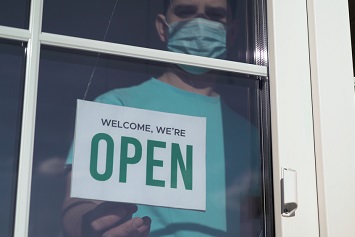The Massachusetts High Technology Council, a regional industry group, recently examined issues involved in reopening businesses and asking employees to return to work in the ongoing coronavirus disease 2019 (COVID-19) pandemic. A new report in the New England Journal of Medicine summarized their conclusions.
COVID-19 is a respiratory illness caused by the SARS-CoV-2 virus. COVID-19 currently is widespread in most U.S. communities and considered a workplace hazard.
The report includes a table of policies employers can adopt to reduce transmission of the SARS-CoV-2 virus, including several less expensive ones:
- Mandating and monitoring the use of cloth face coverings and personal protective equipment (PPE);
- Encouraging frequent hand-washing or sanitizing and encouraging employees and customers to avoid touching their eyes, nose, and mouth and practice sneeze and cough etiquette;
- Providing employees with a comprehensive checklist of COVID-19 symptoms so they can self-diagnose before leaving home;
- Staggering break and lunch times and staggering or reducing duration of work shifts;
- Encouraging social distancing and discouraging gatherings of large groups;
- Frequent deep workplace cleaning and designating hygiene zones with sanitization checkpoints between;
- Temperature measurement and symptom checks at entries;
- Remodeling workspaces to increase distances between coworkers or workers and customers; improved air filtration and ventilation; and touch-free handles and interfaces;
- Encouraging telework, especially for older employees and those with coexisting conditions;
- Discouraging any unnecessary travel and deploying infection-control practices and PPE during necessary travel; and
- Limiting use of mass transit and carpooling.
The recommendations from the Massachusetts High Technology Council closely mirror those for office buildings from the Centers for Disease Control and Prevention (CDC) that included wearing cloth masks throughout the workday; maintaining a social distance of 6 feet, including in elevators; and increasing ventilation.
The Massachusetts High Technology Council also recommended two more expensive interventions: testing and contact tracing.
The National Safety Council (NSC) also recommended employers adopt testing and contact tracing to control the spread of the SARS-CoV-2 virus in the workplace. The NSC suggested employers consider postponing reopening until they are fully prepared to protect employees from COVID-19 infections.
Testing has some limitations as a control measure. Tests for infections only yield valid results for the time the specimen is taken; an employee may test negative for COVID-19 and subsequently become infected. Antibody testing confirms the test subject has antibodies for the SARS-CoV-2 virus, but researchers have not determined whether the presence of antibodies confers immunity.
Contact tracing using mobile apps also has problems. The apps’ algorithms depend on an index patient voluntarily reporting his or her diagnosis through the app. Requiring employees to download and use contact tracing apps would require employers to provide smartphones for all employees without one.
Properly implemented testing and contact tracing are effective infection control measures that are difficult to implement in the workplace. However, the most effective and most readily implemented controls are relatively inexpensive: enforcing social distancing protocols and encouraging hand-washing; requiring employees to wear cloth face coverings in the workplace; offering sick leave and instructing infected employees to seek treatment or self-isolate; reducing density in the workplace; using physical barriers and cleaning and disinfecting commonly touched surfaces; and carefully managing air exchange and filtration.

